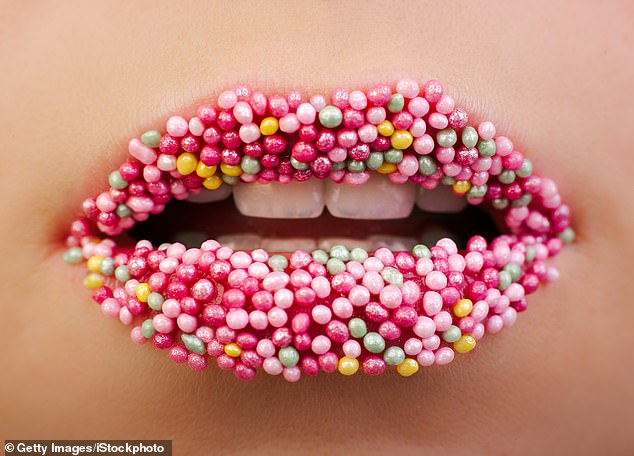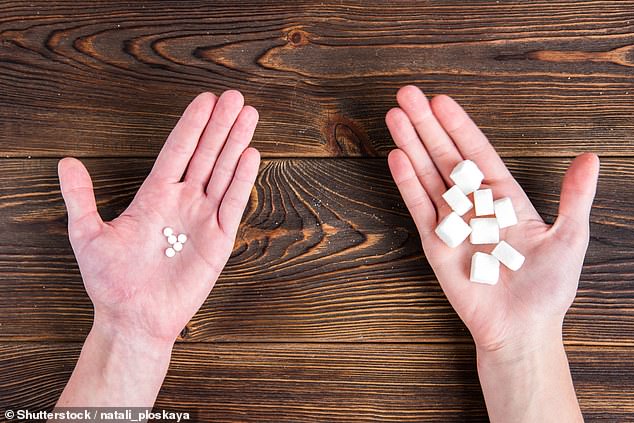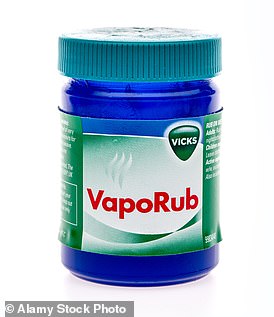With studies suggesting they could raise your risk of diabetes and depression… Why artificial sweeteners may NOT be healthier than sugar
Artificial sweeteners are everywhere, from breakfast cereals and yogurt to diet drinks, ice cream, instant coffee, chewing gum and toothpaste, as well as prescription medications such as antidepressants and antibiotics.
In Britain we have become gluttonous for these fascinating chemical additives, relying on their sweet taste without the caloric risks of natural sugar.
In fact, we swallow a third of all artificial sweeteners sold in the world, and last November it was reported that 2.2 million Britons use artificial sweeteners at least four times a day.
Artificial sweeteners are between 100 and (amazingly) 13,000 times sweeter than natural sugar, according to a study from Sorbonne University, Paris, published in the European Journal of Clinical Nutrition in 2007.
But the problem is that our brains build up a tolerance to such a gargantuan sweet treat that it quickly becomes our “normal,” making naturally unsweetened foods like fruits and vegetables bland and unappetizing, the researchers say.

Artificial sweeteners are everywhere, from breakfast cereals and yogurt to diet drinks, ice cream, instant coffee and toothpaste, as well as prescription drugs like antidepressants and antibiotics
This nutritionally disruptive effect would not have to be a problem if artificial sweeteners had an otherwise neutral effect on our body. However, there is increasing evidence that they are linked to health problems.
For example, research published last month shows that ultra-processed foods and drinks, especially those with artificial sweeteners, may be linked to a greater risk of depression.
This was based on an analysis of the Nurses’ Health Study in the US, involving almost 32,000 women, by researchers from Harvard Medical School and Massachusetts General Hospital (published in JAMA Network Open).
This did not prove that artificial sweeteners were a cause. However, the researchers suggested that they “may trigger the transmission of certain signaling molecules in the brain that are important for mood.”
In addition, a 12-year study of more than 100,000 adults in France, reported in the BMJ last September, found that the more artificial sweeteners consumed, the greater the risk of cardiovascular disease.
There are also concerns about sweeteners increasing people’s risk of developing type 2 diabetes by interfering with their body’s ability to regulate blood sugar levels in a healthy way.
A study in the journal Cell last year found that saccharin and sucralose can significantly raise blood sugar levels in healthy people. The researchers warned that sweeteners can disrupt the microbes in our gut that normally secrete substances into our blood that help us regulate it.

Artificial sweeteners are between 100 and (amazingly) 13,000 times sweeter than natural sugar, according to a study by Sorbonne University, Paris (File image)
Ironically, many people switch from sugar to artificial sweeteners to avoid developing type 2 diabetes by losing weight.
However, the switch may increase the risk of obesity. A 2017 study in the Canadian Medical Association Journal of more than 400,000 people found that those who drank one or more artificially sweetened drinks per day over a 10-year period had a significantly higher risk of weight gain, type 2 diabetes and heart disease.
One reason for this weight gain may be the ‘feeling of being cheated’. Research by psychologists at Texas Christian University found that people who drank an artificially sweetened beverage subsequently ate sugary foods much more often than those who drank water or sugar-sweetened beverages, Appetite magazine reported in 2014.
The suggestion is that consuming chemicals hundreds of times sweeter than sugar triggers our metabolism to prepare for a large influx of calories – and when the calories don’t arrive, the body increases its appetite in search of the missing calories, so people then binge on fattening foods, according to Susan Swithers, professor of psychology at the Ingestive Behavior Research Center at Purdue University Indiana (writing in the journal Trends in Endocrinology and Metabolism in 2013).
Based on the evidence to date, the World Health Organization (WHO) published new guidance on sweeteners in May, advising that they do not help with long-term weight management and may have unintended effects, such as an increased risk of type 2 diabetes and cardiovascular disease.
The industry disputed this conclusion and questioned the strength of the evidence. But what if you want to get rid of these chemicals? It may seem impossible, not least because natural sugar itself seems so difficult to avoid.
A 2013 paper by scientists at the University of Bordeaux warned: ‘Evidence in humans shows that sugar and sweets can produce rewards and cravings comparable in magnitude to those produced by addictive drugs.’
Furthermore, the report, published in the journal Current Opinion in Clinical Nutrition and Metabolic Care, states that experiments in laboratory rats have shown that “sugar and sweet rewards can not only replace addictive drugs such as cocaine, but can even be more rewarding and attractive.” However, recent evidence suggests that artificial sweeteners are significantly easier to avoid than refined sugar.
In 2020, neuroscientists at Columbia University reported that while sugar and artificial sweeteners activate the same taste sensors on our tongue, receptors in our stomach respond in different ways.
The report, published in the journal Nature, suggests that natural sugar activates neurons in the stomach that send signals to an area in the primitive base of our brains called the caudal nucleus of the solitary tract.
According to the lead researcher, Dr. Charles Zuker, this gut-brain signaling makes us want more sugar. However, his experiments showed that only natural sugar causes this reaction, because the intestinal receptors ignore all the chemicals in artificial sweeteners.
Sweeteners and sugar affect the brain in a different way, with only natural sugar creating a feeling of addiction. Or as Dr. Zuker says: ‘Sweet is tasty, sugar is deficient.’
So giving up artificial sweeteners may be less difficult than natural sugar.
And it may only last a matter of days: A trial involving 20 artificial sweetener users, published in The Permanente Journal in 2015, found that after just two weeks of going ‘cold turkey’ on the chemicals, their taste significantly improved. had been reset.
The study, conducted by nutritionists at the University of California, Los Angeles, concluded that after 14 days of abstinence, “95 percent of participants found sweet foods and drinks tasted sweeter or too sweet, and 75 percent thought unsweetened foods (such as fruit and vegetables) tasted sweeter’.
Helen Bond, a dietitian and spokesperson for the British Dietetic Association, told Good Health: ‘While going cold turkey may work for some people, for many it is simply too abrupt.’
Instead, she says, “Careful cutting back may work better for many people because it takes time to adjust our sense of taste to the natural levels of sweetness in food, and to break the habit of expecting things like tea and coffee tastes sweet. It’s a bit like avoiding high salt content in food.’
While that may mean cutting out some industrially processed foods, such as ‘light’ yoghurts high in sweeteners, it doesn’t mean you should avoid them altogether, argues Helen Bond.
‘We have been steadily persuaded to eat processed foods with artificial sweeteners, but it should certainly be easy to find everyday products such as affordable packaged breads and cereals without sweeteners.
‘At the same time, we can adapt relatively easily to eating naturally sweet seasonal fruits and vegetables, such as apples, and to foods with a natural sweetness, such as oats.’
Dr. Chris Van Tulleken, the author of Ultra-Processed People: Why Do We All Eat Stuff That Isn’t Food, told Good Health that with his own family, “I try to keep them from off-flavors, especially sweeteners, as part of trying to ensure their diet is free of ultra-processed foods’.
‘Yet the children get sweeteners in chewing gum, which they love, and when visiting friends and family they get it in fruit pumpkins.
‘Sweeteners in children’s medicines such as antibiotics and liquid paracetamol cannot be avoided either, as they are packed with them.’
Dr. Van Tulleken acknowledges that his family can afford a fresh food diet. “Not everyone can do this,” he says. ‘But in children it is still possible to omit things that are not necessary in a diet, such as so-called ‘healthy’ pumpkins and yoghurt.’
Following the WHO’s publication of its new guidance in May, industry body the International Sweeteners Association (ISA) said: ‘Low or no calorie sweeteners are safe to use, are one of the most thoroughly researched ingredients in the world and have been approved by all major food safety authorities, including the European Food Safety Authority.
‘The ISA believes that it is a disservice to public health if the role of low/no calorie sweeteners in reducing sugar and calorie intake and aiding weight management is not recognised.’

